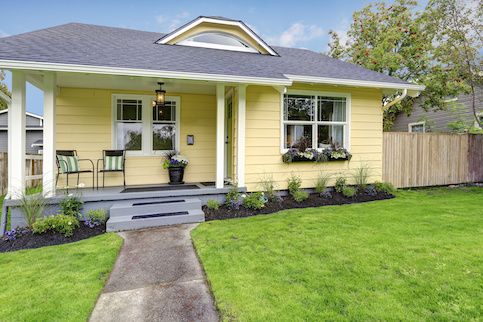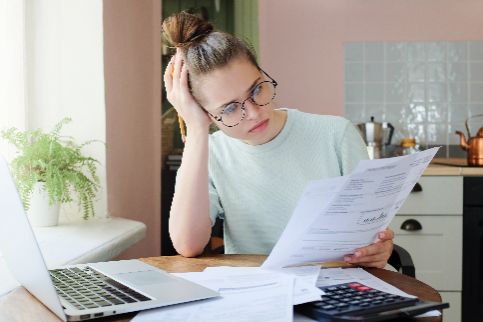Paying Off Your Mortgage Early: A Complete Guide

Eliminating your monthly mortgage payment could create a significant amount of breathing room for most homeowners. If you’re interested in paying off your mortgage early, it might be a goal worth pursuing for your financial situation. We will explore how to decide if paying off your mortgage early is the right move for you, and common strategies you can use to reach this goal.
Can You Pay Off Your Mortgage Early?
Not only is it possible to pay off your mortgage early, this decision could transform your financial situation. If you choose to pay off your mortgage early, you can potentially save thousands of dollars in mortgage interest.
As a homeowner, you have two different options for paying off your mortgage early. You can either make a larger one-time payment to settle your mortgage balance or make extra payments toward the principal of your mortgage loan to pay it off sooner.
For example, let’s say you have a mortgage balance of $200,000, a 6% interest rate, and 15 years left in your loan term. If you had $200,000 available, you could pay off the entire balance at once.
The other option is to make extra payments along the way. For example, let’s say you pay an extra $300 per month toward your mortgage. In this case, you would pay off your mortgage almost 3.5 years ahead of schedule and save over $25,000 in interest payments.
Compare And Save
Have control over your money. Shop all your financial options in one place.
See What You Qualify For
Home Purchase
Home Refinance
Tap Into Equity
Should You Pay Off Your Mortgage Early?
Whether it’s best to pay off a mortgage early depends entirely on the homeowner and their unique financial situation. Of course, there are great benefits in the long run, the biggest being no longer having a mortgage and enjoying significant home equity.
But if you’re going to be strapped for cash by making extra payments or stall your progress toward other important financial goals, then an early mortgage payoff may not be right for you. For example, if you have unsecured debt with a higher interest rate, it might be more efficient for your finances to pay off other debts before paying off your mortgage.
If you have a low interest rate locked in for your mortgage, investing in assets with the potential for a higher return could make more sense. For example, stopping contributions to your retirement funds to pay off your mortgage early could backfire in the long term.
How To Pay Off Your Mortgage Early With A One-Time Payment
If you decide that paying off your mortgage early is the right move for your finances, and have the funds available, follow the steps below to pay off your mortgage:
1. Request A Payoff Letter
Once you’re ready, contact your lender to let them know you want to pay off the remaining balance of your mortgage. In some cases, the payoff will involve extra fees. But you’ll be able to see all of the details in a payoff letter.
Make sure you only request the payoff letter when you’re ready. Additional payoff letter requests may incur extra fees.
2. Pay Off The Mortgage Balance
After you have the payoff letter, you can send the final payment to your mortgage lender. Before sending over the funds, ask the mortgage lender how they want to receive them. Depending on your situation, you might choose to transfer or wire the funds.
It’s a good idea to track the payment to ensure it goes through.
3. File A Discharge Of Mortgage Letter
After you’ve paid off the mortgage, you’ll likely need to file a discharge of mortgage letter with your local government. The records office needs this paperwork to release the deed to your home. In most situations, this process is typically handled by the lender.
4. Manage Recurring And Ongoing Payments
The mortgage payments associated with your home loan represent a significant portion of your homeownership costs. However, paying off your mortgage doesn’t eliminate all of your homeownership-related expenses. As a homeowner, you’ll still be responsible for homeowners insurance, property tax payments and any homeowners association (HOA) fees.
If you’ve been paying for these recurring payments through an escrow account, this will no longer be the case once your mortgage is paid off. In some cases, you’ll receive a refund from your escrow account.
Paying Off Your Mortgage Early With Long-Term Strategies
Making a lump sum payment isn’t an option for every homeowner who wants to eliminate their mortgage. Luckily, you can pursue other strategies to pay off your mortgage early.
Make A Larger Down Payment
A larger down payment upfront can lead to a smaller home loan. If you’re able to put down at least 20%, you should be able to avoid private mortgage insurance, which adds to your homeownership costs.
One option is to save up for a bigger down payment. But it’s also worth researching down payment assistance (DPA) programs to help you make a bigger dent in your home loan. Just remember that not all lenders accept all DPA programs. It’s best to talk to your lender to determine what will be accepted.
Use A Mortgage Recast
A mortgage recast involves making a lump-sum payment toward the principal balance on your home loan. Through a recast, you can lower your monthly payments without changing the loan term or interest rate.
Pay Extra Over Time
Making extra payments toward your mortgage can also help pay it off faster. While some people choose to make additional payments on a consistent basis, others do so whenever they come into some extra cash.
No matter when you decide to make extra payments, tell your lender that the money is going toward your principal balance. If you fail to make this clear, your lender could assume you want to apply the funds to next month’s payment and your money could end up being allocated incorrectly.
Make An Extra Annual Payment
An extra annual payment can make a big difference to your repayment timeline. For example, let’s say you have a 30-year home loan with a 6% interest rate for $200,000. If you make an extra annual payment of $1,000, you could save over $42,000 in interest payments and shave almost 5 years off of your loan term.
Make Biweekly Payments
Making smaller, biweekly payments, as opposed to traditional monthly payments, is another way you can pay off your mortgage faster. With this method, you can cut months off your mortgage term and save thousands of dollars in interest because you’re effectively making one full, extra mortgage payment per year that gets applied directly to your principal balance. And, if you get paid biweekly, making payments biweekly may just make sense because you can schedule your payments around your paydays.
Refinance To A Shorter Mortgage Term
Refinancing your mortgage enables you to trade in your current loan for one with better terms, like a lower interest rate and/or shorter term length. Shorter-term loans usually come with lower interest, but if interest rates are lower than when you took out your original loan, you may be able to get a reduced rate regardless.
For example, let’s say you took out a 30-year home loan with a 6% interest rate for $200,000 5 years ago. At this point, you’ve decided to refinance the 30-year mortgage to a 15-year mortgage. If the interest rate stays at 6%, your monthly payment will go from $1,199 to $1,687. Although you’ll pay hundreds of dollars more each month, you’ll pay off your loan 10 years earlier.
Paying Off Your Mortgage Early: FAQs
You have questions about paying off your mortgage early. We have answers.
Can I find out if there’s a prepayment penalty before requesting a payoff letter?
Some home loans include prepayment penalties. You can find out if your home loan includes this penalty by reading through your original mortgage loan documents or asking your loan servicer.
How many extra payments can I make each year?
You can make as many extra payments as you want each year. But, in general, biweekly represents the greatest number of payments you would choose to make in a year. Other standard options include extra payments monthly, quarterly or annually.
If I make extra payments, should I ask my lender to apply them to my principal balance?
Yes. If you make extra mortgage payments, you should ask your lender to apply them to the principal balance. Otherwise, the lender could use the funds to prepay your monthly mortgage payments.
The Bottom Line
Paying off your mortgage early is a worthwhile option to consider. While you can go about this goal in several different ways, refinancing to a shorter loan term can help you lock in your early repayment goals. If you think refinancing could be right for your situation, today.
Find A Mortgage Today and Lock In Your Rate!
Get matched with a lender that will work for your financial situation.











